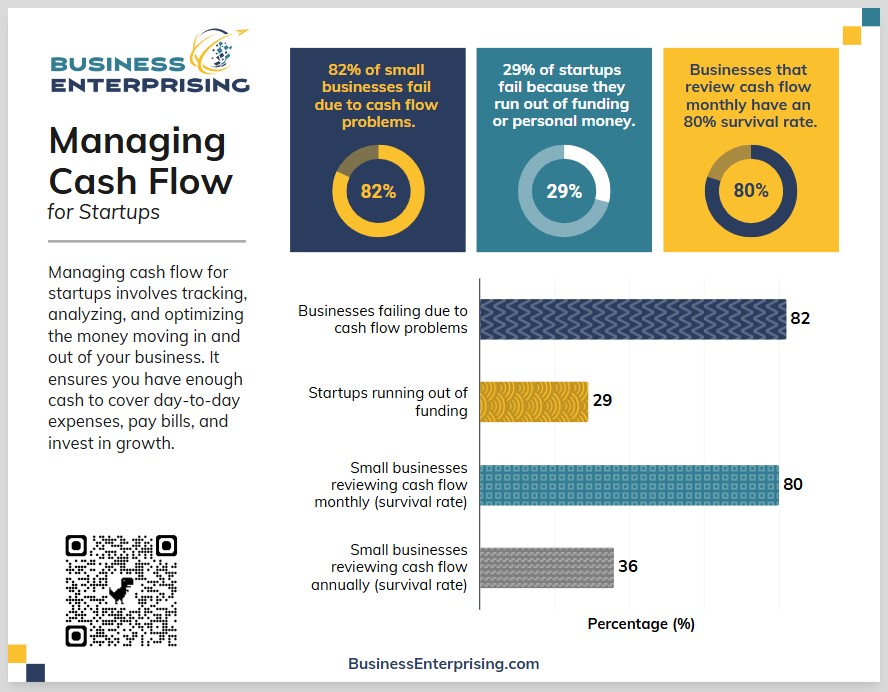
Startups often face unique challenges, from irregular revenue streams to high upfront costs. Addressing these issues requires proactive planning and also careful monitoring of your financial activities. By staying on top of your cash flow, you can make informed decisions and adapt to unexpected changes.
This guide will explore strategies to help you optimize cash flow and build a stronger financial foundation. With the right approach, you can minimize risks and position your business for long-term success. Managing cash flow effectively allows you to focus on what matters most—growing your startup.
Understanding Cash Flow: The Lifeblood of Startups
Cash flow represents the movement of money into and out of your business. It reflects your ability to meet day-to-day expenses. For startups, managing cash flow is essential to staying operational and growing steadily. Without proper oversight, even profitable businesses can struggle to cover expenses when cash flow is tight.
Cash inflows include revenue from sales, funding from investors, or loans. Outflows involve operating expenses, salaries, and loan repayments. Understanding this dynamic helps you track when and where money is coming in and going out. With this insight, you can anticipate challenges and make better decisions about spending and saving.
Many people confuse cash flow with profitability, but they are not the same. Profitability measures long-term financial success, while cash flow is about short-term liquidity. A startup can show profits on paper yet fail if it cannot pay immediate bills. Recognizing this distinction is key to keeping your business running smoothly.
By focusing on managing cash flow for startups, you gain a clearer view of your financial health. You can take action to avoid shortfalls and create a stable foundation for growth. Developing good cash flow habits early sets you up for long-term success.
Common Cash Flow Challenges for Startups
Startups often face irregular revenue streams, which can create gaps between income and expenses. Sales may fluctuate, especially during early growth stages. These inconsistencies make it harder to predict cash availability and plan for future payments. You must carefully track your income patterns to manage periods of lower revenue.
High initial expenses add another layer of difficulty. Launching a business often requires significant spending on equipment, marketing, and salaries. These costs can drain your resources before revenues catch up. If you’re not prepared, this imbalance could lead to financial strain and missed opportunities.
Late payments from customers or clients can further complicate managing cash flow for startups. When payments don’t arrive on time, it disrupts your ability to pay vendors or invest in growth. Establishing clear payment terms and following up consistently can reduce this risk and improve your cash flow stability.
Recognizing these challenges is the first step toward solving them. By proactively addressing irregular income, high expenses, and late payments, you can build a more reliable cash flow system. Taking action early helps you avoid shortfalls and focus on growing your business with confidence.
Strategies for Optimizing Cash Flow Management
Setting up cash flow forecasting is an effective way to optimize your financial management. A forecast helps you anticipate future cash inflows and outflows. With this tool, you can prepare for potential shortfalls and make smarter financial decisions. It’s essential to update forecasts regularly to keep them accurate and useful.
Monitoring and analyzing financial data regularly also improves your cash flow management. By reviewing your numbers often, you can identify trends and spot issues early. This practice allows you to adjust quickly to changes in revenue or expenses. Staying on top of your financial data ensures you remain in control.
Prioritizing essential expenditures is another key strategy for managing cash flow for startups. Focus your spending on what’s necessary to operate and grow your business. Avoid unnecessary costs, especially during times of limited cash flow. This disciplined approach helps you maintain liquidity and reduces financial stress.
These strategies provide a solid foundation for improving your cash flow management. By forecasting, monitoring data, and prioritizing spending, you can build a more resilient financial plan. Taking these steps now sets your business up for long-term stability and growth.
Leveraging Technology for Cash Flow Management
Leveraging technology can simplify managing cash flow for startups by streamlining processes and providing clearer financial insights. Cash flow tracking and forecasting tools help you monitor your financial health and predict future trends. These tools allow you to identify patterns and plan for upcoming expenses or revenue fluctuations. With accurate forecasts, you can avoid surprises and stay prepared.
Automation of invoicing and payment reminders can also reduce cash flow disruptions. Automated systems send invoices promptly and follow up on unpaid bills, saving you time and effort. Timely reminders encourage clients to pay on schedule, which improves your cash flow. This approach minimizes delays and also keeps your operations running smoothly.
Integrating cash flow tools with your accounting system provides real-time insights into your financial position. This integration allows you to see up-to-date data without manual reconciliation. With everything connected, you can make informed decisions faster and avoid costly mistakes. Real-time updates give you the confidence to act decisively when managing your finances.
By using technology effectively, you can streamline your processes as well as improve your cash flow management. These tools provide valuable data and reduce manual tasks, freeing you to focus on growing your business. For startups, embracing these solutions can make all the difference in maintaining financial stability.
Securing Additional Funding to Improve Cash Flow
Securing additional funding can be a practical way to address cash flow challenges for your startup. Loans, angel investors, and venture capital offer different avenues for obtaining needed capital. Loans provide quick access to funds, though repayment terms must align with your cash flow. Angel investors or venture capitalists may bring larger investments, but they often expect equity or active involvement in your business. Exploring these options carefully ensures the funding matches your long-term goals.
Managing investor expectations is equally important when securing outside funding. Investors typically look for transparency as well as clear plans for using their capital. Keeping them informed about your progress and challenges helps build trust. Regular updates also demonstrate your commitment to success and encourage continued support. Aligning your vision with theirs creates a more productive partnership.
Maintaining a cash buffer is a smart strategy to improve financial flexibility. A reserve can help you manage unexpected expenses or periods of slow revenue. It reduces reliance on external funding and allows you to address short-term cash flow gaps independently. Building a buffer requires disciplined saving, but the effort pays off in long-term stability.
Securing additional funding plays a key role in managing cash flow for startups. By exploring options, maintaining open communication with investors, and creating a cash buffer, you strengthen your financial position. These steps allow you to focus on growing your business with fewer interruptions.
Tips for Sustaining Healthy Cash Flow During Growth
Sustaining healthy cash flow during growth requires careful planning and resource management. Scaling operations without overextending your resources is a key strategy. Expanding too quickly can strain your finances and lead to shortfalls. Focus on incremental growth, and align your spending with realistic revenue projections. This approach helps you avoid unnecessary debt while maintaining operational stability.
Effective inventory and supplier management can also support healthy cash flow. Overstocking ties up cash, while understocking risks lost sales. Monitoring inventory levels regularly allows you to strike a balance and meet customer demand. Strong relationships with suppliers can also help you negotiate favorable terms, such as extended payment deadlines, which improve cash flow flexibility.
Balancing reinvestment with liquidity needs is another important aspect of managing cash flow for startups. Growth often requires reinvesting profits into your business, but keeping enough cash on hand is equally important. Allocating funds strategically ensures you can cover expenses and seize opportunities without jeopardizing financial stability. Periodically reviewing your cash flow allows you to adjust your reinvestment strategy as your business evolves.
By scaling cautiously, managing inventory efficiently, and also balancing reinvestment with liquidity, you can sustain healthy cash flow during growth. These practices create a stable financial foundation, allowing your business to thrive while avoiding unnecessary risks.
Conclusion
Managing cash flow for startups is essential for building a stable and successful business. Cash flow management helps you prepare for challenges and seize opportunities. By understanding your financial position, you can make informed decisions and adapt to changing circumstances.
Staying proactive is key to maintaining healthy cash flow. Use tools, track expenses, and prioritize spending to keep your finances on track. Regularly reviewing your financial data allows you to identify trends and make timely adjustments.
By implementing these strategies, you can avoid unnecessary stress and also focus on growing your business. A disciplined approach to managing cash flow creates a strong foundation for long-term success.



